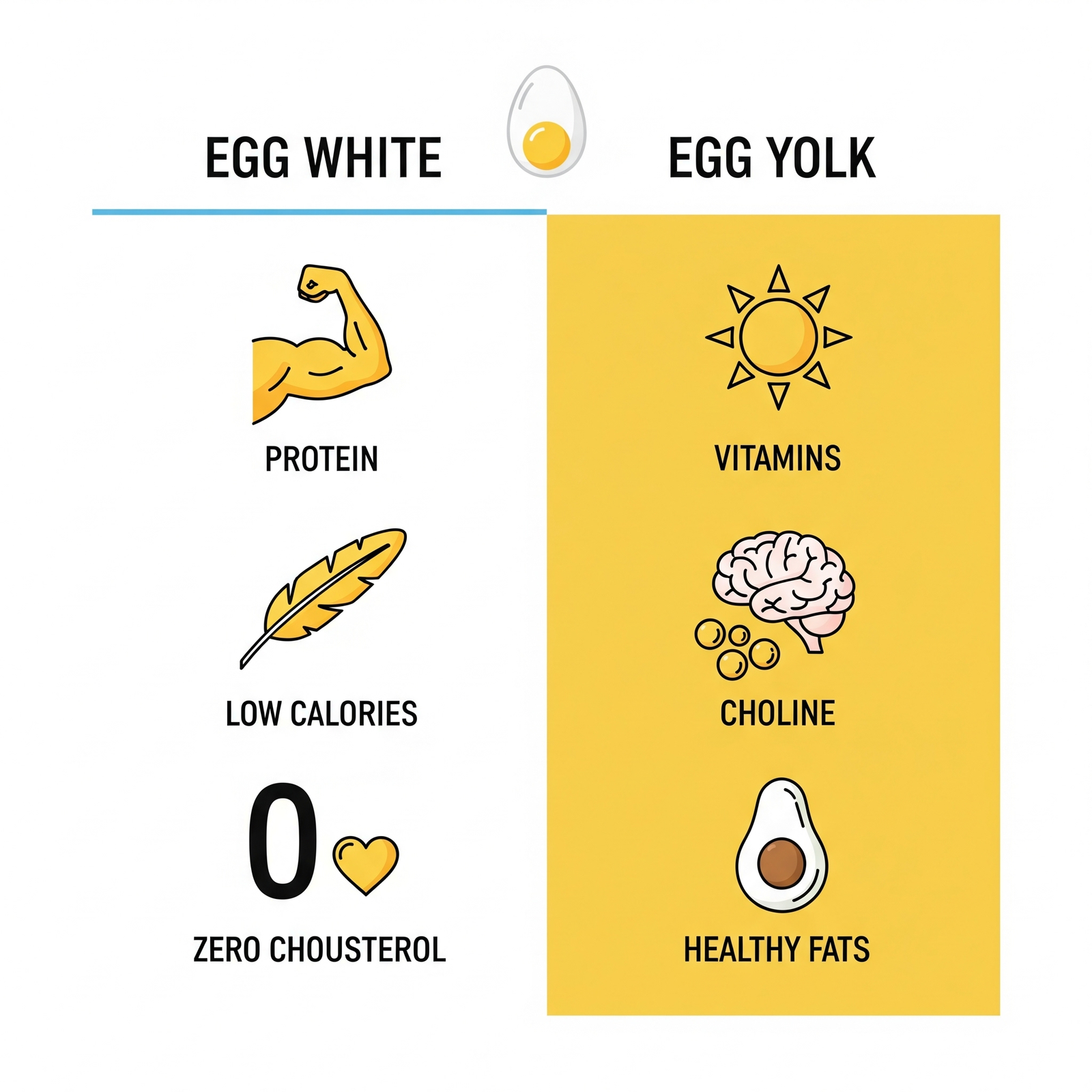Physical Address
304 North Cardinal St.
Dorchester Center, MA 02124
Physical Address
304 North Cardinal St.
Dorchester Center, MA 02124

For decades, the humble egg has been at the center of a heated nutritional debate, with cholesterol as the main villain. This has led many health-conscious eaters to shun the yolk in favor of the seemingly pristine egg white. But what’s the real story? As a registered dietitian, I’ve had countless conversations about this very topic. Let’s crack open the facts, separate the myths from the science, and get to the bottom of the cholesterol content in egg whites.
[IMAGE PROMPT: A clean, top-down shot of a cracked egg on a dark slate background. The bright yellow yolk is perfectly contained in one half of the shell, while the clear, glistening egg white has been separated into a simple white ceramic bowl. The lighting is bright and natural.]
When you separate an egg, you are creating two distinct nutritional profiles. The egg white, technically known as the albumen, is primarily composed of protein and water. Let’s look at the specific nutrition facts for the white of one large egg (approximately 33 grams):
It’s easy to see why egg whites are a favorite among athletes and those looking to manage their weight. You get a significant dose of high-quality, complete protein—meaning it contains all nine essential amino acids—for a minimal caloric cost. This makes them excellent for building muscle, repairing tissue, and promoting feelings of fullness.
So, if the white has zero cholesterol, is it automatically the healthier choice? Not so fast. The decision to ditch the yolk means you’re also tossing out a wealth of vital nutrients.
Here’s a look at what the yolk of that same large egg provides:
The concern for many people, especially those with a history of heart disease, stems from that 186 mg of cholesterol. However, major health organizations have shifted their stance in recent years. Research has shown that for the majority of the population, dietary cholesterol has a surprisingly small effect on blood cholesterol levels. As the American Heart Association points out, our bodies are adept at regulating cholesterol. It’s the intake of saturated and trans fats that plays a much larger role in raising harmful LDL cholesterol levels.
Unequivocally, yes. Egg whites are a fantastic, healthy food. They are an ideal choice if your primary goal is to maximize protein intake while minimizing calories, fat, and of course, cholesterol. This is particularly beneficial for:
For the average person, enjoying the whole egg is generally considered safe and highly nutritious. One whole egg per day can easily fit into a heart-healthy diet.
I’ve compiled answers to some of the most common questions I hear about egg whites and cholesterol.
1. Are eggs high in cholesterol? Whole eggs are considered a high-cholesterol food, with a single large egg containing about 186 mg. However, all of this cholesterol is in the yolk. Egg whites contain no cholesterol.
2. What are the calories in an egg white? The white of one large egg contains approximately 17 calories, making it a very low-calorie food.
3. How much protein is in egg whites? A large egg white provides about 3.6 grams of high-quality, complete protein.
4. What are the overall egg white nutrition facts? For one large egg white: 17 calories, 3.6g protein, 0g fat, 0g cholesterol, 0.2g carbs, 55mg sodium, and 54mg potassium.
5. Are egg whites healthier than whole eggs? “Healthier” depends on your individual goals. Egg whites are better for low-calorie, high-protein, zero-cholesterol needs. Whole eggs offer a broader spectrum of vitamins and minerals, including vital nutrients like Vitamin D and choline, which are absent in the whites. For most people, the whole egg provides more comprehensive nutritional benefits.
[IMAGE PROMPT: Photorealistic action shot of a person in fitness attire whisking egg whites in a glass bowl. The whites are frothy and voluminous. The background is a bright, clean kitchen setting, suggesting health and preparation. The focus is on the motion and texture of the whisked egg whites.]
The fear of dietary cholesterol has been largely overstated. For the vast majority of us, the nutrients lost by discarding the yolk outweigh the benefits of avoiding its cholesterol. The key to managing blood cholesterol is to focus on a balanced dietary pattern, rich in fruits, vegetables, lean proteins, and healthy fats, while limiting processed foods high in saturated and trans fats.
So, the next time you’re in the kitchen, you can feel confident that enjoying the whole egg is a healthy, nutrient-dense choice. And if you need a pure protein boost or are following specific medical advice, the humble, cholesterol-free egg white is an excellent and reliable option.